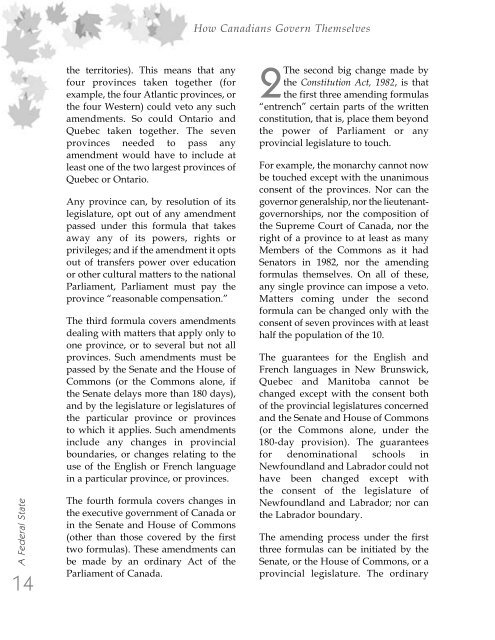How Canadians Govern Themselves - Parlement du Canada
How Canadians Govern Themselves - Parlement du Canada
How Canadians Govern Themselves - Parlement du Canada
Create successful ePaper yourself
Turn your PDF publications into a flip-book with our unique Google optimized e-Paper software.
<strong>How</strong> <strong>Canadians</strong> <strong>Govern</strong> <strong>Themselves</strong>A Federal State14the territories). This means that anyfour provinces taken together (forexample, the four Atlantic provinces, orthe four Western) could veto any suchamendments. So could Ontario andQuebec taken together. The sevenprovinces needed to pass anyamendment would have to include atleast one of the two largest provinces ofQuebec or Ontario.Any province can, by resolution of itslegislature, opt out of any amendmentpassed under this formula that takesaway any of its powers, rights orprivileges; and if the amendment it optsout of transfers power over e<strong>du</strong>cationor other cultural matters to the nationalParliament, Parliament must pay theprovince “reasonable compensation.”The third formula covers amendmentsdealing with matters that apply only toone province, or to several but not allprovinces. Such amendments must bepassed by the Senate and the House ofCommons (or the Commons alone, ifthe Senate delays more than 180 days),and by the legislature or legislatures ofthe particular province or provincesto which it applies. Such amendmentsinclude any changes in provincialboundaries, or changes relating to theuse of the English or French languagein a particular province, or provinces.The fourth formula covers changes inthe executive government of <strong>Canada</strong> orin the Senate and House of Commons(other than those covered by the firsttwo formulas). These amendments canbe made by an ordinary Act of theParliament of <strong>Canada</strong>.2The second big change made bythe Constitution Act, 1982, is thatthe first three amending formulas“entrench” certain parts of the writtenconstitution, that is, place them beyondthe power of Parliament or anyprovincial legislature to touch.For example, the monarchy cannot nowbe touched except with the unanimousconsent of the provinces. Nor can thegovernor generalship, nor the lieutenantgovernorships,nor the composition ofthe Supreme Court of <strong>Canada</strong>, nor theright of a province to at least as manyMembers of the Commons as it hadSenators in 1982, nor the amendingformulas themselves. On all of these,any single province can impose a veto.Matters coming under the secondformula can be changed only with theconsent of seven provinces with at leasthalf the population of the 10.The guarantees for the English andFrench languages in New Brunswick,Quebec and Manitoba cannot bechanged except with the consent bothof the provincial legislatures concernedand the Senate and House of Commons(or the Commons alone, under the180-day provision). The guaranteesfor denominational schools inNewfoundland and Labrador could nothave been changed except withthe consent of the legislature ofNewfoundland and Labrador; nor canthe Labrador boundary.The amending process under the firstthree formulas can be initiated by theSenate, or the House of Commons, or aprovincial legislature. The ordinary




